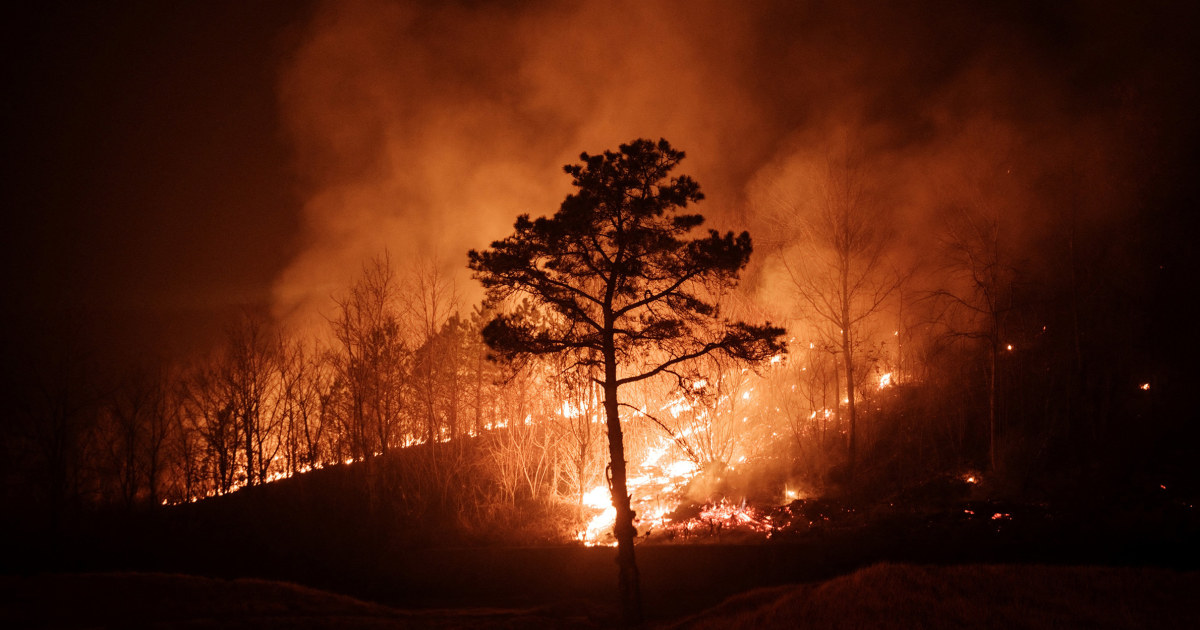Southern South Korea’s Wildfires: A Catastrophe Unfolds
A devastating wave of wildfires in southern South Korea has claimed 18 lives and forced the evacuation of 27,000 residents. As the flames continue to spread, the impact on local communities and economies raises urgent questions about disaster preparedness and environmental resilience. The ongoing crisis highlights the pressing need for effective disaster management strategies in a region increasingly vulnerable to extreme weather events.
The Scope of the Disaster
In recent weeks, southern South Korea has been engulfed by a series of wildfires that have wreaked havoc across the region. These blazes have not only led to tragic loss of life but have also displaced thousands from their homes. Communities in the path of the flames face an uncertain future, as the fires have destroyed homes, infrastructure, and vital natural resources.
The scale of the disaster is staggering. With approximately 27,000 people evacuated, local shelters are overwhelmed, and many families are left without basic necessities. Emergency services are working tirelessly to combat the fires and assist those affected. However, the challenges they face are immense, given the unpredictable nature of wildfires fueled by dry weather conditions and strong winds.
Impact on Local Communities
The impact of these wildfires extends far beyond immediate physical destruction. Local economies are suffering as businesses are forced to close, and tourism—a significant source of income for many areas—has taken a substantial hit. The beautiful landscapes that attract visitors are now marred by smoke and charred earth, prompting many to question the future viability of these regions as tourist destinations.
- Displacement: Thousands of residents have been forced to evacuate, leading to a surge in demand for emergency housing and resources.
- Economic Consequences: Local businesses are struggling to cope with the aftermath of the fires, which may lead to long-term economic decline in affected areas.
- Psychological Impact: The trauma of losing homes and livelihoods can lead to long-lasting psychological effects on individuals and families.
Environmental Concerns
Wildfires have a profound effect on the environment, and the recent blazes in southern South Korea are no exception. The destruction of forests and wildlife habitats not only affects biodiversity but also contributes to climate change. As trees are lost, the natural ability of the environment to absorb carbon dioxide diminishes, exacerbating global warming concerns.
Furthermore, soil erosion becomes a significant issue after wildfires, as the protective vegetation that holds the soil in place is removed. This can lead to landslides and further ecological degradation, complicating recovery efforts.
Disaster Preparedness and Response
The catastrophic wildfires raise critical questions about disaster preparedness in South Korea. While the country has made strides in developing emergency response strategies, the scale and intensity of these recent fires have revealed gaps in the existing framework.
- Early Warning Systems: There is a need for improved early warning systems that can provide timely alerts to residents in high-risk areas.
- Community Education: Educating communities about fire prevention and preparedness can empower residents to take action before disaster strikes.
- Resource Allocation: Adequate allocation of resources to firefighting services and support for affected communities is crucial for effective disaster management.
Lessons Learned from the Crisis
As southern South Korea grapples with the aftermath of these wildfires, it is essential to reflect on the lessons learned. This tragedy serves as a stark reminder of the importance of environmental stewardship and proactive disaster management. Here are some key takeaways:
- Invest in Infrastructure: Strengthening infrastructure to withstand natural disasters is critical. This includes not only firefighting resources but also community resilience planning.
- Sustainable Practices: Promoting sustainable land management and forestry practices can help reduce the risk of wildfires in the future.
- Community Engagement: Involving local communities in disaster preparedness initiatives fosters a culture of resilience and collective responsibility.
Looking Ahead: A Call for Resilience
As the fires continue to rage, there is a pressing need for a coordinated response from government agencies, NGOs, and community organizations. Support systems must be established to help those affected rebuild their lives and restore their communities. This includes not only immediate assistance but also long-term strategies to enhance resilience against future disasters.
Moreover, there is an urgent need to address the underlying factors contributing to the increasing frequency and intensity of wildfires. Climate change, land use practices, and urban development all play significant roles in exacerbating these disasters. South Korea must look toward a future that prioritizes sustainable development and environmental protection.
In conclusion, the wildfires in southern South Korea represent a catastrophe that has claimed lives and displaced thousands. However, amidst the tragedy lies an opportunity for growth and improvement in disaster preparedness and environmental resilience. By learning from this experience and implementing effective strategies, South Korea can emerge stronger and more prepared for the challenges that lie ahead.
In the face of adversity, communities can come together to support one another, rebuild their homes, and advocate for a more sustainable future. The road to recovery may be long, but with commitment and collaboration, there is hope for a brighter tomorrow.
See more CNET 247



